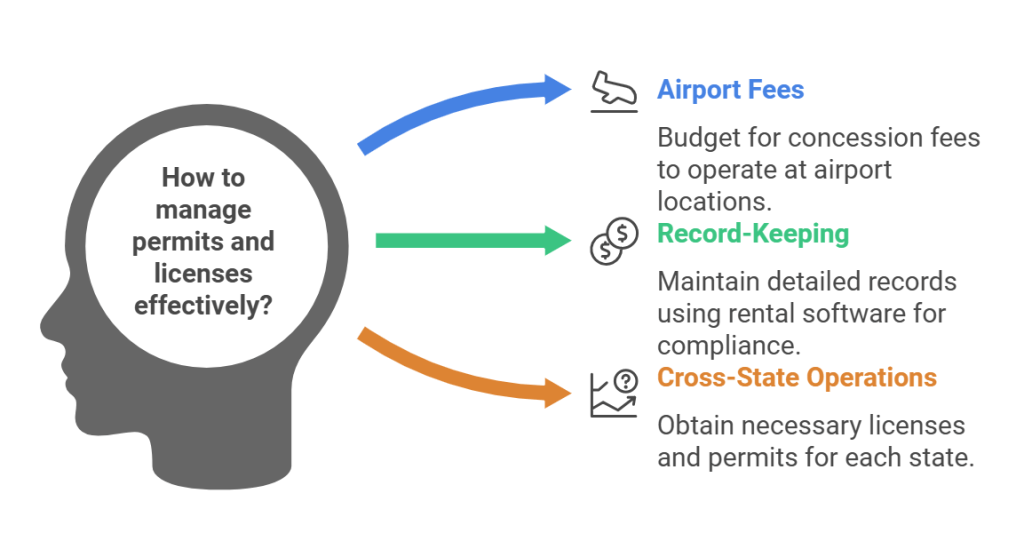Starting a car rental business can be profitable, but securing the necessary permits and licenses for a car rental business is critical to your success. Without them, navigating legal requirements can become a major hurdle. Here’s a comprehensive guide to help you stay compliant and operate without interruptions.

Why Permits and Licenses for Car Rental Business Matter
Permits and licenses for car rental businesses ensure compliance with local, state, and federal laws. Operating without them can result in fines, lawsuits, or even forced closure. Legal compliance also builds trust with your clients and protects your assets.
Read next: How to Start a Car Rental Business
Key Permits and Licenses You’ll Need for a Car Rental Business
Launching and running a car rental business requires obtaining several essential permits and licenses. Each serves a specific purpose, ensuring your operations are legal and compliant with local, state, and federal regulations. Here’s a detailed look at the key licenses you’ll need:
1. Business License
A business license is a fundamental requirement for operating legally in any city or state. It serves as your business authorization and signals to clients and regulators that you comply with local business laws.
- Why It’s Important: Without a business license, your operations could be deemed unlawful, leading to penalties or even shutdowns.
- How to Apply: Visit your local finance office to submit your application. Many cities allow this process to be completed in person or online for convenience.
- What You’ll Need to Provide:
- Your business name
- A description of the services you’ll offer (e.g., short-term car rentals, long-term leases)
- Insurance provider details
- Number of employees (even if you’re starting solo, this is often required)
- Ongoing Requirements: Most business licenses must be renewed annually, and fees vary depending on location and business size. Ensure you track deadlines to avoid lapses in compliance.
2. Certificate of Authority
Obtaining a Certificate of Authority is essential if your business plans to operate beyond your home state. This document allows your business to legally function in other states without registering as a new entity.
- Why It’s Essential: This certificate simplifies cross-state operations and ensures compliance with interstate commerce laws for businesses with a regional or national presence.
- How It Works: After acquiring a business license in your home state, apply for the Certificate of Authority in each additional state where you plan to operate.
- Pro Tip: Ensure your business’s names and registration details are consistent across all states to avoid unnecessary delays or rejections.
3. Federal and State Tax Identification Numbers for Car Rental Business
Tax compliance is a non-negotiable part of any business, and car rental operations are no exception. A Federal Tax Identification Number (EIN) and a State Tax Identification Number are critical for adhering to tax laws.
- Federal Tax ID (EIN): Issued by the IRS, this number is required for filing federal taxes, hiring employees, and opening business bank accounts.
- State Tax ID: This is needed to report state-level taxes, including sales and payroll taxes.
- Application Process: You can apply for an EIN online through the IRS website. State tax IDs are issued by your state’s tax office or Department of Revenue. Each application requires specific business details, so gather all necessary documents beforehand.
- Record-Keeping Tip for your Car Rental Business: Keep these identification numbers secure but accessible for use in tax filings, audits, and financial reporting.
Also read: How to Start a Scooter Rental Business
4. Zoning Permits for Car Rental Business
Every business operates within a designated area, and securing zoning permits for car rental businesses is essential. A zoning permit ensures your business complies with local land-use regulations.
Zoning laws aim to balance a community’s residential, commercial, and industrial areas. Operating without the proper zoning permits for your car rental business could result in fines or eviction from your business location.
- Steps to Obtain Zoning Permits for Car Rental Business:
- Check your local zoning regulations to verify whether your chosen location is approved for car rental operations.
- Consult with your local zoning office to understand specific requirements or restrictions for car rental businesses in your area.
- Submit a zoning permit application, including details about your business plan and property layout.
- Special Considerations:
- Ensure adequate space for your fleet, customer parking, and any required signage.
- Verify compliance with your location’s noise, traffic, and environmental regulations.
Necessary Permits for Car Rental Business
1. State Business Permits
- Required to legally operate in many states.
- Often tied to maintaining proper insurance and adhering to local ordinances.
2. Motor Vehicle Rental Tax Permit
- Mandatory in states like Texas if:
- Rentals are under 180 days.
- Vehicles are re-rented or manufactured for rental.
- Apply by submitting the appropriate forms to your state comptroller’s office.
Insurance Essentials
A robust insurance plan is vital for your car rental business. It safeguards your operations and assures customers of their safety.
1. Liability Insurance
- Protects your business from legal claims.
- Covers property damage and personal injury.
2. Customer Coverage Options
- Offer additional insurance at the time of rental, including:
- Loss Damage Waiver (LDW)
- Personal Accident Insurance
- Personal Effects Coverage
- Educate customers about their coverage options.
Other Considerations for Permits and Licenses for Car Rental

1. Airport Fees
- Businesses operating at airports may face concession fees.
- Budget accordingly if you plan to serve airport locations.
2. Record-Keeping
- Maintain meticulous records for:
- Vehicle details (VIN, model, license plate)
- Insurance policies
- Tax filings
- Use rental software solutions to streamline compliance.
3. Cross-State Operations
- Operating in multiple states increases the complexity of compliance.
- Obtain the required licenses and permits for each state or municipality.
Best Practices for Legal Compliance
- Hire Legal Counsel
- A qualified lawyer ensures your contracts, permits, and licenses are in order.
- Keep Documents Updated
- Renew licenses annually and update insurance policies as needed.
- Routine Maintenance
- Regularly service your fleet to meet safety standards.
- Client Agreements
- Use detailed rental agreements to set clear terms and minimize disputes.
Bottom Line
Securing the proper permits and licenses is non-negotiable for running a car rental business. These legal requirements protect your business, ensure smooth operations, and build customer trust. Stay proactive by maintaining detailed records, renewing your licenses on time, and consulting professionals when needed. Legal compliance isn’t just a hurdle; it’s the foundation of your business’s success.
By following these guidelines, you can focus on growing your fleet and delighting your customers without worrying about compliance issues.
Streamline Your Fleet Management Today!
Visit Fleet Finesse to discover smarter solutions for your business. Get started now and take control of your operations with ease!
